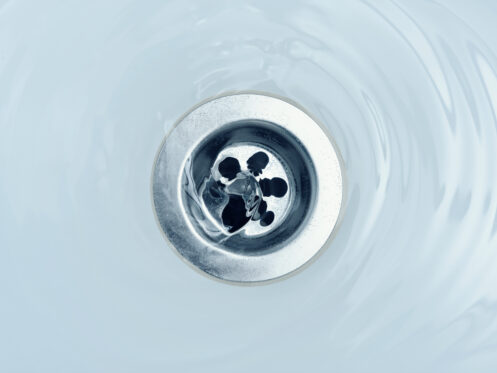A rotten egg smell coming from your drain may cause concern and discomfort. You can spend days trying to find the cause, and you may mistakenly blame the waste bin, dog, or fridge for it. Several factors could come into play when the drain has a rotten egg smell. To develop solutions, you must first understand the reasons why your drain has this foul odor.
Understanding Rotten Egg Smell
The unpleasant rotten egg smell comes from a gas called hydrogen sulfide. This gas is released when bacteria break down organic matter. If this breakdown happens in your pipes, your plumbing system will start to smell bad. The gas can also find its way through the pipes and make your drain smell. Even in small amounts, the sulfur compounds in hydrogen sulfide create that familiar rotten egg odor.
1. Sewer Gas
The sewer line is likely the cause of the smelly odor in your drain, and it needs immediate attention. A leak in the sewer line underneath your home could be releasing gas into your living space. Similarly, broken drain pipes can enable sewer gases to enter your home via damaged pipes in your yard. If you suspect this is the cause of the smell, contact a professional plumber.
2. Leaking Pipes
When the pipes behind your walls or beneath the floor leak, smelly gases from the drain line escape into the pipes. In some cases, a barrier of water traps the gas, but the areas behind the walls encourage the growth of bacteria and mold. While mold has a musty smell, bacteria break down the escaping waste, creating a hydrogen sulfide gas. Unseen leaks may pose a lot of damage and require a professional plumber to detect.
3. Trapped Food Blockages
Although you may take all the necessary precautions to prevent food from getting into your sink, small pieces may still get in. An accumulation of these food particles and other organic matter may block your drain, causing it to drain much slower and ultimately resulting in a foul odor.
4. Collapsed Drain
After unblocking the drains, if you continue to notice a lingering unpleasant odor, it could be a sign of a collapsed drain. This issue typically arises from inadequate drain maintenance and pipe damage over time. In addition to the foul smell, you might observe dampness, mold growth, and possibly a wet or sunken spot in your yard. It is essential to reach out to a professional plumber promptly if you suspect that a collapsed drain is the culprit for these issues.
5. Biofilm Buildup
Biofilm is a colony of bacteria waste with a glue-like slime look, either orange or pink. It forms in situations where the bacteria have sufficient access to resources like hair, oil, dirt, and soap scum. This substance clings to house surfaces like bathtubs, showerheads, and tiles. The best way to remove biofilm is to clean the drain with a bathroom cleaning solution. To stop biofilm from appearing, you must clean your bathroom once a week to prevent bacteria from forming in the drains.
6. Clogged Drains
To maintain a healthy plumbing system, it is crucial to ensure that drain pipes are free from buildup. One effective way to prevent clogs is by using all drains regularly, including those in less frequently used areas like the basement. When a drain pipe becomes clogged, sewer gas can accumulate beneath the blockage, resulting in unpleasant odors. Over time, the clog can exacerbate the foul smell. Regular drain maintenance can help prevent these issues and keep your plumbing system functioning smoothly.
7. Anode Rod Reaction
In some situations, the smell of rotten eggs only comes from the hot water. This may be from a reaction between water and the anode rod. Your water heater may contain an anode rod whose purpose is to protect it from corrosion. The material in the anode rods is magnesium or aluminum. If your water has an average level of naturally occurring sulfate ions, they can react with the anode rod material, giving off the rotten egg odor.
8. Contaminated Water
In some instances, the unpleasant rotten egg smell emanating from your drains may be traced back to contaminated water. This contamination could stem from high levels of sulfates in the water, which, under certain conditions, react to produce hydrogen sulfide gas, known for its distinctive rotten egg odor. This issue can arise particularly in homes using well water or in areas where water treatment is compromised.
To effectively tackle this problem, installing a specialized treatment system designed to remove sulfates or convert hydrogen sulfide into a non-odorous form is essential. Before taking action, it’s crucial to have your water professionally tested to identify the exact nature of the contaminants and determine the most effective treatment solution. In the meantime, using bottled water for drinking and cooking is a safe interim measure until the issue is fully resolved and your water is confirmed safe for use.
9. A Dry or Dirty P-Trap
The P-trap is an essential component of your plumbing system designed to retain water to create a seal. This water barrier acts as a preventive measure, keeping sewer gases from entering your home through the drains. If the P-trap becomes dry, it loses its effectiveness in blocking these gases.
When debris accumulates at the bottom of the P-trap, it can lead to the growth of bacteria and produce a foul odor, commonly described as a rotten egg smell. Regular maintenance and cleaning of the P-trap can help prevent this issue and ensure the proper functioning of your plumbing system.
Solutions to Get Rid of That Rotten Egg Smell in Your Drains
A tailored approach addressing the root cause is essential to effectively eliminating the rotten egg smell from your drains. Hire a professional plumber for thorough cleaning to tackle issues like clogged drains, biofilm buildup, and a dirty P-trap. If the smell emanates from your water heater due to a corroded anode rod, consider replacing it or consulting a professional for appropriate solutions.
Implementing preventative measures, such as installing hair catchers and sink strainers, can significantly reduce the likelihood of blockages. Regularly flushing out infrequently used drains with water helps maintain a wet P-trap, preventing sewer gas from entering your home. For homes with hard water, an iron filter can mitigate the formation of sulfates, curtailing the conditions that lead to the unpleasant smell. Remember, identifying the precise cause with the help of a professional is the first step toward a lasting solution.
Contact Your Local Plumbing Pros
While the uncomfortable rotten egg smell is not what any homeowner wants to deal with, it does not mean you have an emergency plumbing situation. However, you can get in touch with the nearest plumber to get an accurate assessment and determine the cause of action. At Tennessee Standard Plumbing, we are the local plumbing experts you can count on for professional, friendly service. In addition to drain cleaning, our services include pipe repair, leak detection, leak repairs, sewer repair, water filtration, and water treatment. Contact us today to schedule an appointment with our skilled plumbers in Knoxville.


